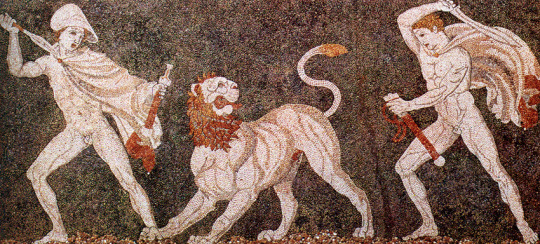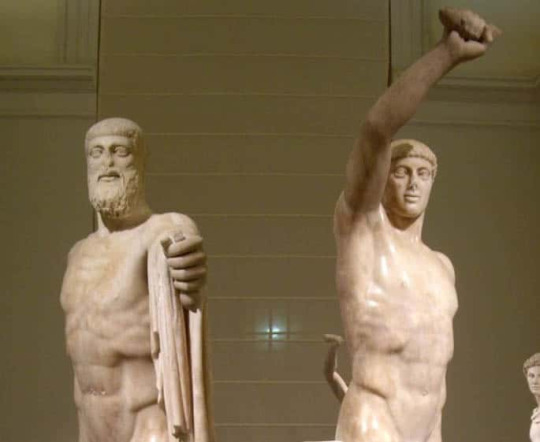#Hermalaos's Conspiracy
Note
Hi, I'm curious about the incident with the Pages, what exactly happened with that? Was Alexander not exactly a "kid" person and the pages didn't really bond with him? It seems extreme for them to want him dead. I thought of Alexander as a people person who wanted to be liked. He seemed to care about his brother, even with his disability. Maybe that's just Renault's influence since her books portrayed Alexander as compassionate and empathetic. I think you'd provide a better take on it, thanks!
What happened with the Pages or, as Beth likes to refer to them (accurately) the King’s Youths* had nothing to do with Alexander’s feelings towards kids or even teenagers. It had to do with timē, or public honor. I’ve written before about the importance of timē in Macedonian politics, particularly with regard to Pausanias’s murder of Philip.
Before I go further, however, I want to point to an excellent article by senior Macedoniast Elizabeth D. Carney, “The Role of the Basilikoi Paides at the Macedonian Court,” in Macedonian Legacies, Howe and Reames, eds., (2008), 145-64** Beth doesn’t just write about Olympias and Macedonian Women. She frequently deals with Macedonian court politics, and that’s what this article addresses. The incident with the Pages is examined in detail, and she comes to somewhat different conclusions about the complexities of it than she did in her earlier “Regicide in Macedonia,” although the latter should be read by anyone wanting to understand why Pausanias killed Philip (see linked post above).
Much of what follows summarizes Beth’s article, but read the whole thing as she explores a number of intriguing issues surrounding the Pages. (Beth is a good writer, clear, unlike some.)
Back to timē. One of the (many) jobs of the King’s Youths involved attending the king on hunts.
Also, a critical ritual that marked the movement from boyhood to manhood in Macedonian society was a hunt wherein the boy was expected to spear a boar (very dangerous prey) without nets (to hold it). If you read Dancing with the Lion: Becoming, Alexander undergoes that very ritual in chapter 3.
Anyway, most Macedonians would have undergone this rite-of-passage in their mid/late teens, possibly early 20s. Much is made of the fact Kassandros hadn’t, even though he was in his 30s. It was seen as a lack of courage (and thus manliness: andreia).
Furthermore, there was a Persian tradition that nobody in the royal hunting party could strike at an animal until the king had. To anticipate the king was a serious affront. Persians were all about rank and status.
Macedonians didn’t really have rules, per se, but something similar seems to have been assumed (unless the king intended somebody else to be chief hunter). In Macedonian hunts, competition was very much the name of the game, and “helping” the king wasn’t appreciated. Lysimachos found that out the hard way. That Krateros had the gall not just to save Alexander from a lion, but commemorate it in an ex-voto, is notable, although it was actually Krateros’s son who commissioned the statue group (c. 320 BCE) memorializing his father’s bravery … after both his father and Alexander were dead. By choosing that event of many in his father’s career, what do you think is the message sent? Not just his father’s ties to Megalexandros, but that Alexander wouldn’t be Alexander without Krateros. Perhaps it was his son’s way to hit back at Alexander’s own elevation of Hephaistion (his dad’s chief rival) to semi-divine status as a hero.

Another bit of background, Alexander had been trucking around Asia for about six years by the time this occurred. He was getting reinforcements for troops, but it’s not clear he was getting other reinforcements: e.g., new Basilikoi Paides. Hatzopoulos has theorized not, or if he did, it was early in the campaign, when he sent back Koinos and Meleager along with the newlyweds to Macedonia for a “break” in the winter of 334/3, to make new little Macedonians. They returned with reinforcements. So, maybe we can shave off a year. Still, and assuming Hammond is right that boys were King’s Youths only between about 14 and 18, these “boys” were getting a bit long in the tooth, even the youngest being past the 4-year appointment.
A lot of focus is spent on the conspiracy, Kallisthenes as their stoic-ish teacher, and fluffed up speeches (written by Curitus) about freedom and tyranny… It comes off very Romanized. I won’t go into Kallisthenes, but he reminds me a bit of some US Senators (Ben Sasse): a lot of hot air about principles while kissing ass with his votes. In Kallisthenes’s case, kissing ass with his glowing, propagandic history written for the Greeks. Even his own uncle (Aristotle) thought he didn’t know when to keep his mouth shut. (Yeah…don’t think much of the guy; can you tell?)
What people have forgotten about—but Beth discusses—is the lead up to the conspiracy. What prompted it?
A hunt gone wrong prompted it. Hermolaos stepped between the king and his quarry, to spear the boar for himself. One source says he did it because he thought the king in trouble, but the other doesn’t give that as a motivation.
A-ha! Did you just say that in your head? You should have. 😊
The fallout: a furious Alexander had Hermolaos not only flogged, but also took away his horse. (Kinda like Dad taking the keys to your car.)
Now, flogging wasn’t that shocking (horrible as it sounds) in Greek and Macedonian society. “Spare the rod and spoil the child” is a saying they’d condone. Normally it was reserved for slaves and children (and women). The King’s Youths were a little old for it but…it’s the king. Curtius specifically states that the Basilikoi Paides performed jobs that were normally slaves’ duty, but being for the king, it became an honor. Plus most of these teens would age out c. 18 into another unit, probably the Hypaspists (Pezhetairoi under Philip) or the Companion Cavalry.
But—if Hatzopoulos is right—these young men may have been some years past 18, which would make a flogging especially humiliating. Even if they weren’t, and Alexander had been getting new Basilikoi Paides post-Gaugamela as well as new troops, Hermolaos was still a touchy teen punished like a “little boy” or a slave for just trying to spear his boar and be a man!
In punishing Hermolaos for insulting Alexander’s timē, Alexander, in turn, insulted his. Alexander no doubt saw it as a breach of discipline and decorum, as well as a slap at his own courage and prowess in the hunt. But to Hermolaos, it was, as Beth points out, “emasculating.”
Keep in mind: these are young men, even if late teens/early twenties. Everything’s a crisis. They’re also the sons of the top tier Macedonian elite, so very tetchy about their honor. And the Basilikoi Paides would have been an absolute stew of competition and testosterone poisoning.
I can just imagine a background to this of his mates teasing him, “When ya gonna get your boar, Hermolaos?” “You too much of a white-belly to face down a boar, Hermolaos?” Etc. Maybe he really did think, for a moment, Alexander was in danger AND this would be his chance! He could protect his king (his job as a Page) AND win his manhood! Two birds with one spear!
Except it didn’t turn out like that.
Smarting from more than the flogging, he would have complained to his friends in the unit, and griping grew legs and became a conspiracy. As Beth points out, they may even have heard fathers and uncles complaining about Alexander’s “Persianizing,” but they only complained. The boys, spurred by youth and Kallisthenes’s attempts to cover his ass-kissing with a pretense of philosophy, imagined themselves—especially Hermolaos and his lover Sostratos—as the new Harmodaios and Aristogeiton. (And yeah, I bet some clever soul pointed out the similarities between Hermolaos’s name and Harmadaios’s.)

So what is usually seen as an event all about Alexander’s increasing Persianizing and tyranny really gives us a peek into the pressure cooker that was Elite Life at the Macedonian court. Now you understand why I keep comparing these guys to a pack of sharks.
More on the Pages, Companions, Somatophylakes at the court....
------------------
(**) The link above takes you to academia-edu where you can obtain a free download not only of that article, but the entire festschrift in honor of Gene. Tim (Howe) and I have made it free in PDF form and very cheap in paper form at Amazon. It’s basically sold at printing cost and a few pennies. All proceeds from paper copies go to the subvention fund of the Association of Ancient Historians, which provides financial assistance to grad students and junior scholars to attend annual meetings. Tim and I get nothing. (You will also help us shaft the dirty dog who bought Regina from its original owner and shafted us by printing and selling copies but giving us no royalties [like we got much anyway]. Academic karma.)
(*) While Beth’s translation of “King’s Youths” is more accurate, I decided not to use it in Dancing with the Lion because it falls awkwardly on the ear, and most people familiar with the court are already familiar with the Pages. That said, I agree with her that “pages” is misleading, causing most to envision pre-pubescent boys after the medieval fashion, whereas these guys are closer to squires.
#Royal Pages#Basilikoi Paides#Pages' Conspiracy#Hermalaos's Conspiracy#Hermalaos#Sostratos#Alexander the Great#Elizabeth Carney#Classics#ancient macedonia#Ancient Greece#Macedonian court#asks#Macedonian Royal Pages#Kallisthenes#Callisthenes#Krateros#Craterus
11 notes
·
View notes